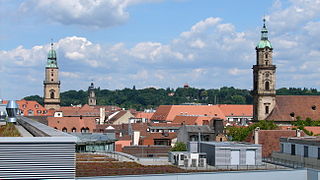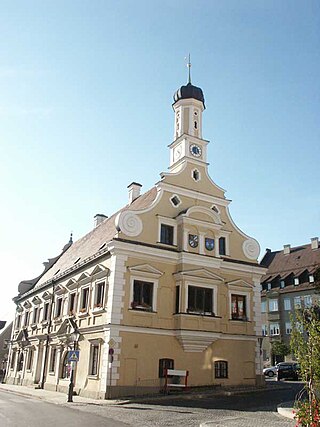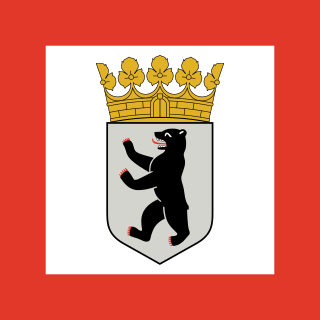
Augsburg is a city in the Bavarian part of Swabia, Germany, around 50 kilometres (31 mi) west of the Bavarian capital Munich. It is a university town and the regional seat of the Regierungsbezirk Swabia with a well preserved Altstadt. Augsburg is an urban district and home to the institutions of the Landkreis Augsburg. It is the third-largest city in Bavaria, with a population of 304,000 and 885,000 in its metropolitan area.
In many countries, a mayor is the highest-ranking official in a municipal government such as that of a city or a town. Worldwide, there is a wide variance in local laws and customs regarding the powers and responsibilities of a mayor as well as the means by which a mayor is elected or otherwise mandated. Depending on the system chosen, a mayor may be the chief executive officer of the municipal government, may simply chair a multi-member governing body with little or no independent power, or may play a solely ceremonial role. A mayor's duties and responsibilities may be to appoint and oversee municipal managers and employees, provide basic governmental services to constituents, and execute the laws and ordinances passed by a municipal governing body. Options for selection of a mayor include direct election by the public, or selection by an elected governing council or board.

Wolfsburg is the fifth-largest city in the German state of Lower Saxony, located on the river Aller. It lies about 75 kilometres (47 mi) east of Hanover and 230 kilometres (143 mi) west of Berlin.
The council–manager government is a form of local government commonly used for municipalities and counties in the United States and Ireland, in New Zealand regional councils, and in Canadian municipalities. In the council-manager government, an elected city council hires a manager to serve as chief executive; this manager can be replaced by a simple majority at any time. It is used in roughly 40% of American cities.

Erlangen is a Middle Franconian city in Bavaria, Germany. It is the seat of the administrative district Erlangen-Höchstadt, and with 116,062 inhabitants, it is the smallest of the eight major cities in Bavaria. The number of inhabitants exceeded the threshold of 100,000 in 1974, making Erlangen a major city according to the statistical definition officially used in Germany.

Klaus Wowereit is a German politician of the Social Democratic Party (SPD) and was the Governing Mayor of Berlin from 21 October 2001 to 11 December 2014. In 2001 state elections his party won a plurality of the votes, 29.7%. He served as President of the Bundesrat in 2001/02. His SPD-led coalition was re-elected in the 2006 elections; after the 2011 elections the SPD's coalition partner changed from the Left to the Christian Democratic Union. He was also sometimes mentioned as a possible SPD candidate for the Chancellorship of Germany (Kanzlerkandidatur), but that never materialized.
A councillor, alternatively councilman, councilwoman, councilperson, or council member, is someone who sits on, votes in, or is a member of, a council. This is typically an elected representative of an electoral district in a municipal or regional government, or other local authority. The title of a councillor varies geographically, with a name generally being preceded by their title in formal or council-related situations in many places.
An alderman is a member of a municipal assembly or council in many jurisdictions founded upon English law with similar officials existing in the Netherlands (wethouder) and Belgium (schepen). The term may be titular, denoting a high-ranking member of a borough or county council, a council member chosen by the elected members themselves rather than by popular vote, or a council member elected by voters.

Friedberg is a town in the district Aichach-Friedberg, Bavaria, Germany, with some 30,000 inhabitants. It is located next to Augsburg at the river Lech. The town was founded in the 13th century in order to collect a toll from people using the bridge across the Lech.
Lord mayor is a title of a mayor of what is usually a major city in a Commonwealth realm, with special recognition bestowed by the sovereign. However, the title or an equivalent is present in other countries, including forms such as "high mayor". Aldermen usually elect the lord mayor from their ranks.

Fellbach is a mid-sized town on the north-east edge of Stuttgart in Baden-Württemberg, Germany. With a population of approximately 45.430 as of December 2020 is the second largest town in the District Rems-Murr-Kreis. The area of the town is 27.7 km2 (10.7 sq mi).

Burgomaster is the English form of various terms in or derived from Germanic languages for the chief magistrate or executive of a city or town. The name in English was derived from the Dutch burgemeester.

Municipalities are the lowest level of official territorial division in Germany. This can be the second, third, fourth or fifth level of territorial division, depending on the status of the municipality and the Land it is part of. The city-states Berlin, Bremen and Hamburg are second-level divisions. A Gemeinde is one level lower in those states which also include Regierungsbezirke as an intermediate territorial division. The Gemeinde is one level higher if it is not part of a Gemeindeverband.

Leutkirch im Allgäu is a former Free Imperial City located in south-eastern Baden-Württemberg, Germany. It is part of the district of Ravensburg, in the western Allgäu region and belongs to the administrative region (Regierungsbezirk) of Tübingen. According to the German Meteorological Service, Leutkirch is one of the sunniest cities in Germany.

Bobingen is a town in Bavaria, Germany. It lies on the rivers Wertach and Singold, on the edge of the Augsburg-Westliche Wälder Nature Park, in Augsburg District, some 13 km south of Augsburg itself.
The government of Hamburg is divided into executive, legislative and judicial branches. Hamburg is a city-state and municipality, and thus its governance deals with several details of both state and local community politics. It takes place in two ranks – a citywide and state administration, and a local rank for the boroughs. The head of the city-state's government is the First Mayor and President of the Senate. A ministry is called Behörde (office) and a state minister is a Senator in Hamburg. The legislature is the state parliament, called Hamburgische Bürgerschaft, and the judicial branch is composed of the state supreme court and other courts. The seat of the government is Hamburg Rathaus. The President of the Hamburg Parliament is the highest official person of the Free and Hanseatic City of Hamburg. This is a traditional difference to the other German states. The president is not allowed to exert any occupation of the executive.

The Senate of Berlin is the executive body governing the city of Berlin, which at the same time is a state of Germany. According to the Constitution of Berlin the Senate consists of the Governing Mayor of Berlin and up to ten senators appointed by the governing mayor, two of whom are appointed (deputy) mayors. The Senate meets weekly at the Rotes Rathaus.

Jakob Wilhelm Benedikt von Langenmantel, also called Jakob Wilhelm Benedikt Langenmantel von Westheim und Ottmarshausen, was a patrician of the city of Augsburg in the Electorate of Bavaria, and mayor of the city.

Hansjörg Durz is a German politician (CSU). He has been a Member of the German Bundestag since 2013. Before that he served as mayor in the bavarian city of Neusäß.













